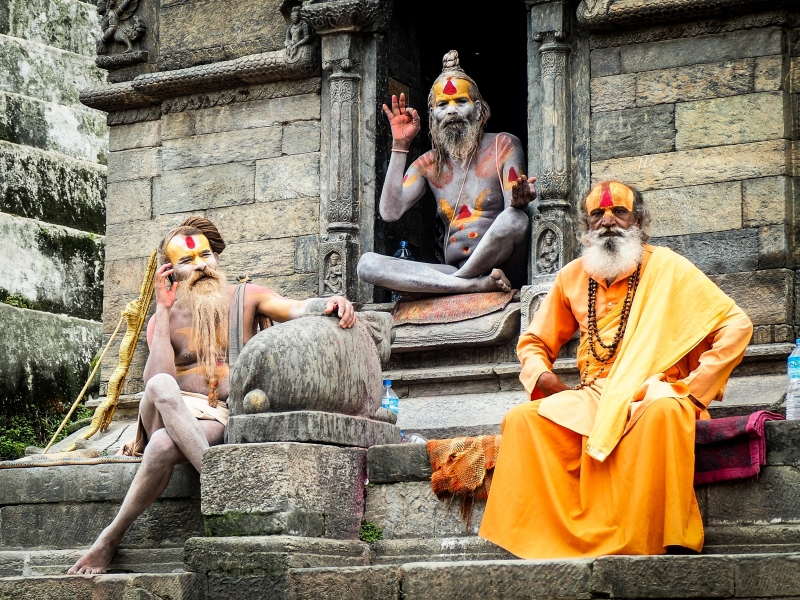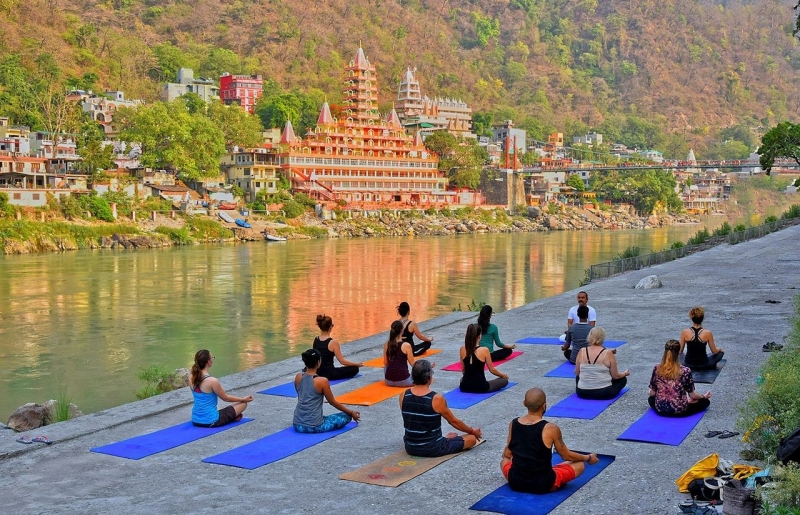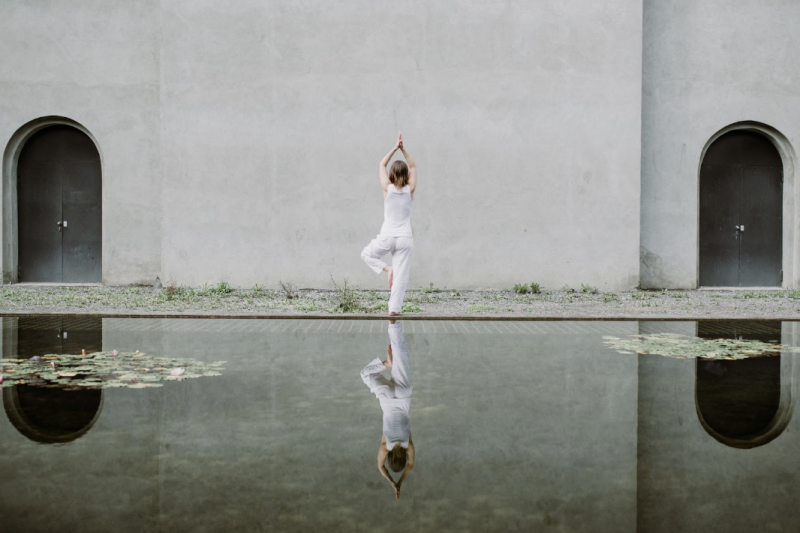Introduction
What does it mean to be a yogi?
What if being a yogi is more than just retreating to a remote location and disconnecting from society?
What if it's about finding a way to integrate the wisdom and practices of yoga into our daily lives, no matter where we are or what we're doing?
Perhaps being a yogi means embodying a state of mindfulness, compassion, and self-awareness that permeates everything we do and every interaction we have. What does it truly mean to be a yogi ?
If you are sincerely committed to embark on an inner transformative journey, then there is no better place to start than by contemplating what it truly means to be a yogi. This transformative journey has the potential to present to you a “you” you may not be familiar with - it requires a deep and unwavering commitment to seeking the truth and surrendering to it completely. Once that happens, all it takes is a sense of discipline in order for that to become your lifestyle.
To become a yogi, you must be willing to give up everything that no longer serves you and embrace what resonates deeply with your soul. This requires a playful and open-minded approach to watching, witnessing, appreciating, and surrendering to the present moment. Through acceptance and assimilation of your reality, you will experience your truest nature. It is important to remember that becoming a yogi is not about mastering complex postures or meditation techniques. Instead, it requires a deep understanding of yourself on a fundamental level. Before embarking on this path, take the time to reflect and
introspect. Only by understanding yourself completely can you hope to unlock
the true potential of the practice of yoga and of yourself.
The path of the yogi
A yogi makes use of the practice of yoga by incorporating yoga into their daily life. This includes not only the physical postures or asanas but also breathing techniques, meditation, and self-reflection. Through these practices, a yogi can develop a deeper awareness of their body, mind, and spirit and dive into their real potential.

For the wanderers, yoga is an ancient practice that originated in India more than 5,000 years ago. It is a holistic approach to health and well-being that aims to integrate mind, body, and spirit. The word "yoga" comes from the Sanskrit word "yuj," which means to yoke or unite. The practice of yoga involves a series of postures (asanas), breathing techniques (pranayama), and meditation that promote physical, mental, and emotional health.
The journey of a yogi is not just about physical fitness or flexibility. It is about developing self-awareness, cultivating inner peace, and finding a deeper sense of purpose. It involves a profound exploration of one's inner self and an understanding of the interconnectedness of all things. In this journey, you must be willing to surrender, even if it means giving up all of that which belongs to your old self. Surrender is not a passive state of resignation but an active state of letting go. It is a state of being where the yogi surrenders their ego, fears, and desires to a higher power or universal consciousness. In this state of surrender, the yogi experiences a deep sense of peace, love, and unity.
The secret of the yogi: from Karma to Dharma
The secret of being a yogi is, in fact, not a secret at all. The secret is a simple, yet subtle truth that lies at the heart of the practice. It is the consistent and dedicated energy towards self-discovery, self-healing and self-realization.
What if the key to unlocking our full potential as yogis lies in stepping out of our comfort zones and facing ourselves head-on?
It is about acknowledging our past, understanding how our actions and behaviors have shaped our present, and ultimately aligning ourselves with our true purpose in life. This is where the concepts of karma and dharma come into play.
Karma represents the path we have inherited from our ancestors, shaped by our past actions and experiences. Dharma, on the other hand, is the path towards our unique purpose in life, which requires us to fulfill our potential for personal and spiritual growth. To become a yogi, one must use the practices of yoga to purify their karma and move towards the dharma path. Through self-reflection, meditation, and discipline, a yogi becomes more aware of their past actions and their impact, and works towards releasing negative patterns and behaviors.
In my own journey towards self-discovery, I found that the most transformative moments came when I was able to recognize my own thoughts and assess if they still aligned with who I am at that moment. It was a powerful process of discerning what truly resonated with me, and what did not. This allowed me to see the world and myself with greater clarity, and ultimately move towards my own dharma path.
What about you? Are you ready to step out of your comfort zone and discover what it truly means to be on the yogi path?
Benefits of Yoga
Yoga can help to improve mental clarity and focus. The mindfulness and concentration practiced in yoga can help to enhance cognitive function and improve memory. Additionally, yoga can help to reduce anxiety and depression, improve mood, and promote a sense of well-being.
Depending on which kind of yoga you practice, you can work with your emotional traumas and get to know parts of yourself that have not been touched upon before. Kundalini yoga is a practice of yoga that focuses on raising the kundalini energy from the base of the spine up through the chakras, helping to clear blockages and release stagnant energy. You can try out a Kundalini yoga workshop and see how it works for your own journey to self-discovery. Get closer to the core of your soul by joining the Kundalini Yoga experience!

Yoga is not just a physical exercise but also a spiritual practice that aims to integrate mind, body, and spirit. It teaches principles such as non-judgment, self-awareness, and compassion, which can help to cultivate a more peaceful and fulfilling life.
The practice of Kundalini Yoga has transformed my life in ways I could never have imagined. With each class, I find myself sinking deeper into a state of peace and tranquility. The dynamic movements, breathwork, and meditations all work together to help me clear my mind and connect with my inner self.
One of the things I love most about Kundalini Yoga is its emphasis on the power of the breath. Through the practice of breathwork, I have learned how to calm my mind and find peace even in the midst of chaos. The breathwork exercises taught in Kundalini Yoga are powerful tools for managing stress and anxiety, and for getting a deep dive into your soul, to get a taste of who you really are. It was the practice of Kundalini yoga that taught me to let go of negative self-talk and embrace self-love and compassion.
Kundalini Yoga has taught me that inner peace is not something that can be found externally. It is something that must be cultivated from within. By connecting with my inner self and releasing blockages, I have found a deep sense of peace that permeates every aspect of my life.
Becoming a yogi
Finding inner peace
Imagine a life where you wake up every morning with a sense of calm and tranquility that comes from within, regardless of the chaos that may be happening around you. This is the gift of inner peace, and it's something that we all crave in our fast-paced and stressful world. Finding inner peace means discovering a sense of serenity and stillness that originates from within. It is a state of being that enables people to find joy and satisfaction, independent of their external conditions. Inner peace is crucial because it empowers individuals to handle stress and anxiety better, build stronger relationships, and live a more satisfying existence.
Yoga is a practice that can help us find this inner peace, by connecting us with our inner selves and promoting self-awareness and self-acceptance. Through physical movements, breathwork, and meditation, yoga helps us to calm our minds and reduce stress and anxiety. It teaches us that true peace comes from within, and is not dependent on external circumstances. Yogis believe that by connecting with their inner selves, individuals can find lasting peace and contentment, and live a more meaningful life.
Just imagine how different your life could be if you were able to find this inner peace. You would be able to manage stress and anxiety more effectively, improve your relationships, and make better decisions. You would cultivate healthier habits and live a more fulfilling life. The practice of yoga can help you get there, one breath at a time.
The practice of letting things go
As easy as it may sound, I found that letting go is, in fact, an easy thing to do. Once you do it, you almost become addicted to the feeling of freedom and deliberation that comes with it.
The art of letting go is an integral part of this practice. Yogis understand that in order to connect with their higher selves, they must be willing to release their attachment to the material world and surrender to the flow of life. This process can be challenging, as it requires individuals to confront their fears and vulnerabilities and let go of their ego. However, it is only by letting go of our attachment to the past and the future that we can fully embrace the present moment and experience true inner peace.
Like a tree shedding its leaves in the fall, the practice of letting go allows us to release the things that no longer serve us and make space for new growth and transformation. It allows us to release our attachment to outcomes and trust in the natural flow of life. The art of letting go requires us to be present and mindful, to embrace change, and to have faith in ourselves and the universe. By cultivating this practice, yogis can achieve a state of inner peace, contentment, and liberation, and experience a deeper connection to themselves and the world around them.
Transforming perception
Yoga is more than just a physical practice - it's a transformative journey that can change the way we see the world. By focusing on compassion and connection, yogis can cultivate a sense of unity with others and find inner peace. The philosophy of yoga encourages individuals to live in the present moment and let go of worries about the past and future. Through mindfulness and physical movements, yogis can release tension and stress from their bodies, leading to mental clarity and emotional well-being. Yoga has the power to shift our perception of life and allow us to see the world with greater clarity and understanding. It's a journey worth taking for anyone seeking the truth and contentment in their lives.
One of the key aspects of the yogic journey is the concept of surrender. Yogis learn to let go of their ego and surrender to a higher power. This surrender allows them to release control and trust in the natural flow of life. It also allows them to experience a sense of freedom and liberation from the constraints of their own thoughts and beliefs.
The journey of a yogi can be compared to the metamorphosis of a caterpillar into a butterfly. Just as the caterpillar must go through a process of shedding its old form to transform into a beautiful butterfly, the yogi must also shed their old beliefs and thought patterns to become their best self. This process of shedding is not always easy, but it is necessary for true transformation. It requires the yogi to confront their fears, push beyond their limits, and surrender to the natural flow of life. Through this process, the yogi emerges as a transformed being, liberated from the constraints of their old self and free to soar to new heights.
Living with purpose
Yogis believe that life has a higher purpose, beyond just material possessions or temporary pleasures. They strive to live in alignment with this purpose and to use their lives to make a positive impact on the world around them.
One of the key principles of yoga is the idea of seva, or selfless service. Yogis believe that by serving others, they can connect with their higher self and find meaning in their lives. For yogis, seva is not just a good deed, but an integral part of their spiritual practice.
Living with purpose also means being mindful of your actions and how they impact others. Yogis strive to live a life of non-harm, or ahimsa, which means avoiding actions that cause harm to others, whether physical or emotional.
Another key principle of yoga is the idea of svadhyaya, or self-study. Yogis believe that by examining their thoughts, emotions, and beliefs, they can gain a deeper understanding of themselves and their purpose in life.

For yogis, living with purpose is not just a goal to be achieved, but a continual process of self-discovery and growth. They see every experience as an opportunity to learn and evolve, and they embrace the challenges and obstacles that come their way as part of their spiritual journey. They embrace every experience, including challenges and obstacles, as opportunities for learning and evolving. For yogis, living with purpose means aligning their thoughts, actions, and beliefs with their core values and using them as a guiding force to make a positive impact on the world.
How to become a yogi?
So, how do one become a yogi?
It all starts within yourself. The love. The care. The acceptance. The peace. They are all rooted inside yourself. If you master the connection between the inside and the outside, you can feel and understand what it means to be a yogi.
Living a balanced life as a yogi means finding harmony between the mind, body, and spirit. It means taking care of our physical, emotional, and spiritual needs, and creating a sense of equilibrium in all aspects of our lives. Here are some tips and practices for living the life of a yogi:
- Practice Yoga Daily: The foundation of a yogi's practice is yoga. It is through the physical practice of yoga that we connect with our bodies, calm our minds, and tap into our inner selves.
- Cultivate Mindfulness: Mindfulness is the practice of being present in the moment, without judgment or distraction. It is a powerful tool for reducing stress, increasing focus, and improving overall well-being. As a yogi, we can cultivate mindfulness through meditation, pranayama, and other mindful practices.
- Eat a Healthy Diet: A balanced diet is essential for maintaining physical health and promoting emotional well-being. As a yogi, we aim to eat foods that nourish our bodies and support our practice. A vegetarian or vegan diet is often preferred by yogis, as it aligns with the principles of non-violence and compassion.
- Connect with Nature: Spending time in nature can be a powerful way to promote balance and harmony. As a yogi, we recognize the interconnectedness of all things and seek to connect with the natural world. Spending time in nature can help reduce stress, improve mood, and increase overall well-being. Take 30 minutes per day and spend them in nature. When you are there, really be present. Feel the wind on your cheeks, smell the trees, feel the leaves in your hands. Be part of the experience and become one with it. Emerse yourself in the beautiful, lively nature’s way of existing. You can find yourself everywhere.
- Prioritize Self-Care: Taking care of ourselves is essential for living a balanced life. As a yogi, we recognize the importance of self-care and prioritize activities that promote physical, emotional, and spiritual well-being. This can include massage, acupuncture, spending time with loved ones, or simply taking a relaxing bath. Learn what works for you. Be on the look-out for those activities that make you feel loved and smothered. Invite yourself on a date weekly and spend a few hours doing what you love be that painting, meditation or dancing. Just set a day and time and meet yourself there.
- Embrace Gratitude: Gratitude is the practice of acknowledging and appreciating the good things in our lives. As a yogi, we aim to cultivate gratitude for all that we have, even in the midst of challenges. Practicing gratitude can help shift our focus from what we lack to what we have, promoting a sense of balance and well-being.
- An easy way to dip your toes into being a yogi is by attending local yoga retreats and workshops. If you find yourself in The Netherlands, I warmly recommend you to check out the workshops organized by The Kundalini Yoga Club.
- Yogi in 1 day event organized by The Kundalini Yoga Club where you get to feel the yogic lifestyle for a day;
- The healing Kundalini Yogi 1.0 online training where you get familiarized with the most powerful form of yoga and meditation;
- Kundalini Yoga Experience with White Tantra where you really feel the magic of Mantras,the Healing of Breathing and the Ecstasy of the Kundalini Energy & White Tantra.
Conclusion
- If you are seeking a transformative journey in which you are ready to meet you in your purest form, you may be on your path to become a yogi. You must be willing to take the first step - and that first step starts with you.
- As you consider the path of the yogi, you may find yourself questioning whether it's truly worth the effort. I warmly encourage you to consider the possibility that there is more to life than what meets the eye. The practice of yoga offers a way to connect with a deeper part of yourself, to uncover the potential that lies within you, and to discover a sense of inner peace that transcends the challenges of everyday life.
- Through the physical practice of yoga, you can learn to listen to your body, to release tension and stress, and to cultivate a greater sense of vitality and well-being. But the journey of the yogi goes beyond just the physical. It involves a commitment to self-reflection, to living with purpose and intention, and to letting go of the beliefs and habits that hold you back from becoming your best self.
- As you embark on this path, you may encounter obstacles and challenges that test your commitment and resilience. But know that every step of the way, you have the potential to learn and grow. Ultimately, becoming a yogi is about cultivating a deeper sense of awareness and connection, both with yourself and with the world around you. It's about living a life of purpose and meaning, grounded in the principles of compassion, non-judgment, and selfless service.
- So why not take that first step and join a yoga class today? Your journey to self-discovery and transformation is right here!






